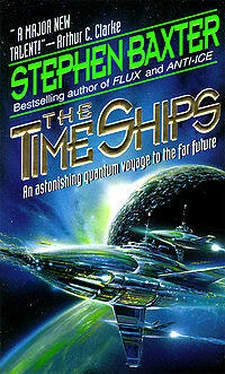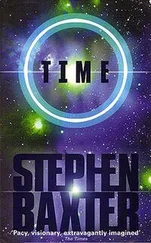There had probably been several waves of star colonization by man and his descendants, said Nebogipfel. During our journey through time in the car, we had seen the launch of one generation of such ships, from the Orbital City.
“It is not difficult to build an interstellar craft,” he said, “if one is patient. I imagine your 1944 friends in the Palaeocene could have devised such a vessel a mere century or two after we left them. One would need a propulsion unit, of course — a chemical, ion or laser rocket; or perhaps a solar sail of the type we have observed. And there are strategies to use the resources of the solar system to escape from the sun. You could, for instance, swing past Jupiter, and use that planet’s bulk to hurl your star-ship in towards the sun. With a boost at perihelion, you could very easily reach solar escape velocity.”
“And then one would be free of the solar system?”
“At the other end a reverse of the process, the exploitation of the gravity wells of stars and planets, would be necessary, to settle into the new system. It might take ten, a hundred thousand years to complete such a journey, so great are the gulfs between the stars…”
“A thousand centuries? But who could survive so long? What ship — the supply question alone—”
“You miss the point,” he said. “One would not send humans. The ship would be an automaton. A machine, with manipulative skills, and intelligence at least equivalent to a human’s. The task of the machine would be to exploit the resources of the destination stellar system — using planets, comets, asteroids, dust, whatever it could find — to construct a colony.”
“Your ’automatons,’ “ I remarked, “sound rather like our friends, the Universal Constructors.”
He did not reply.
“I can see the use of sending a machine to gather information. But other than that — what is the point? What is the meaning of a colony without humans?”
“But such a machine could construct anything, given the resources and sufficient time,” the Morlock said. “With cell synthesis and artificial womb technology, it could even construct humans, to inhabit the new colony. Do you see?”
I protested at this — for the prospect seemed unnatural and abhorrent to me — until I remembered, with reluctance, that I had once watched the “construction” of a Morlock, in just such a fashion!
Nebogipfel went on, “But the probe’s most important task would be to construct more copies of itself. These would be fueled up — for example, with gases mined from the stars — and sent on, to further star systems.
“And so, slow but steady, the colonization of the Galaxy would proceed.”
“But,” I protested, “even so, it would take so much time. Ten thousand years to reach the nearest star, which is some light years away—”
“Four.”
“And the Galaxy itself—”
“Is a hundred thousand light years across. It would be slow,” he said. “At least at first. But then the colonies would begin to interact with each other. Do you see? Empires could form, straddling the stars. Other groups would oppose the empires. The diffusion would slow further… but it would proceed, inexorably. By such techniques as I have described, it would take tens of millions of years to complete the colonization of the Galaxy — but it could he done. And, since it would be impossible to recall or redirect the mechanical probes, once launched, it would be done. It must have been done by now, fifty million years after the founding of First London.”
He went on, “The first few generations of Constructors were, I think, built with anthropocentric constraints incorporated into their awareness. They were built to serve man. But these Constructors were not simple mechanical devices — these were conscious entities. And when they went out into the Galaxy, exploring worlds undreamed of by man and redesigning themselves, they soon passed far beyond the understanding of Humanity, and broke the constraints of their authors… The machines broke free.”
“Great Scott,” I said. “I can’t imagine the military chaps of that remote Age taking to that idea very kindly.”
“Yes. There were wars… The data is fragmented. In any event, there could be only one victor in such a conflict.”
“And what of men? How did they take to all this?”
“Some well, some badly.” Nebogipfel twisted his face a little and swiveled his eyes. “What do you think? Humans are a diverse species, with multiple and fragmented goals — even in your day; imagine how much more diverse things became when people were spread across a hundred, a thousand star systems. The Constructors, too, rapidly fragmented. They are more unified as a species than man has ever been, by reason of their physical nature, but because of the much greater Information pool to which they have access — their goals are far more complex and varied.”
But, through all this conflict, Nebogipfel said, the slow Conquest of the stars had proceeded.
The launching of the first star-ships, Nebogipfel said, had marked the greatest deviation we had yet witnessed from my original, unperturbed History. “Men — your friends, the New Humans — have changed everything about the world, even on a geological — a cosmic scale. I wonder if you can understand—”
“What?”
“I wonder if you understand, really, the meaning of a million years — or ten million — or fifty.”
“Well, I ought to. I’ve traversed through such intervals, with you, on the way to the Palaeocene and back.”
“But then we traveled through a History free of intelligence. Look — I have told you of interstellar migration. If Mind is given the chance to work on such scales—”
“I’ve seen what can be done to the earth.”
“More than that! — more than a single planet! The patient, termite-burrowing of Mind can undermine even the fabric of the universe,” he whispered, “if given enough time… Even we only had a half-million years since the plains of Africa, and we captured a sun…
“Look at the sky,” he said. “ Where are the stars? There is hardly a naked star in the sky. This is 1891, or thereabouts, remember: here can be no cosmological reason for the extinction of the stars, as compared to the sky of your own Richmond.
“With my dark-evolved eyes, I can see a little more than you. And I tell you there is an array of dull-red pinpoints up there: it is infra-red radiation — heat.”
Then it struck me, with almost a physical force. “It is true,” I said. “ It is true… Your hypothesis of Galactic conquest. The proof of it is visible, in the sky itself! The stars must be cloaked about — almost all of them — by artificial shells, like your Morlock Sphere.” I stared out at the empty sky. “Dear God, Nebogipfel; human beings — and their machines — have changed Heaven itself!”
“It was inevitable that it would come to this, once the first Constructor was launched — do you see?”
I stared into that darkened sky, oppressed by awe. It was not so much the changed nature of the sky that astonished me so, but the notion that all this — all of it, to the furthest end of the Galaxy — had been brought about by my shattering of History with the Time Machine!
“I can see that men have gone from the earth,” I said. “The climatic instability has done for us here. But somewhere” — I waved a hand — “somewhere out there must be men and women, in those scattered homes!”
“No,” he said. “The Constructors see everywhere, remember; they know everything. And I have seen no evidence of men like you. Oh, here and there you may find biological creatures descended from man — but as diverse, in their way, from your form of human as I am. And would you count me a man? And the biological forms are, besides, mostly degenerated…”
Читать дальше
Конец ознакомительного отрывка
Купить книгу









